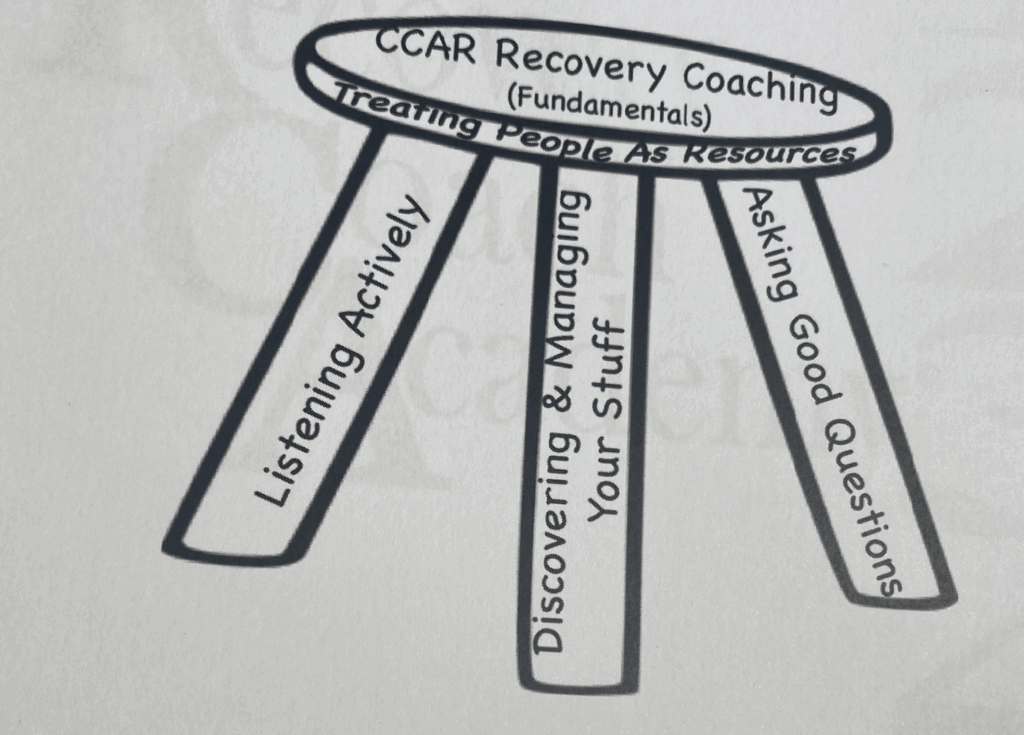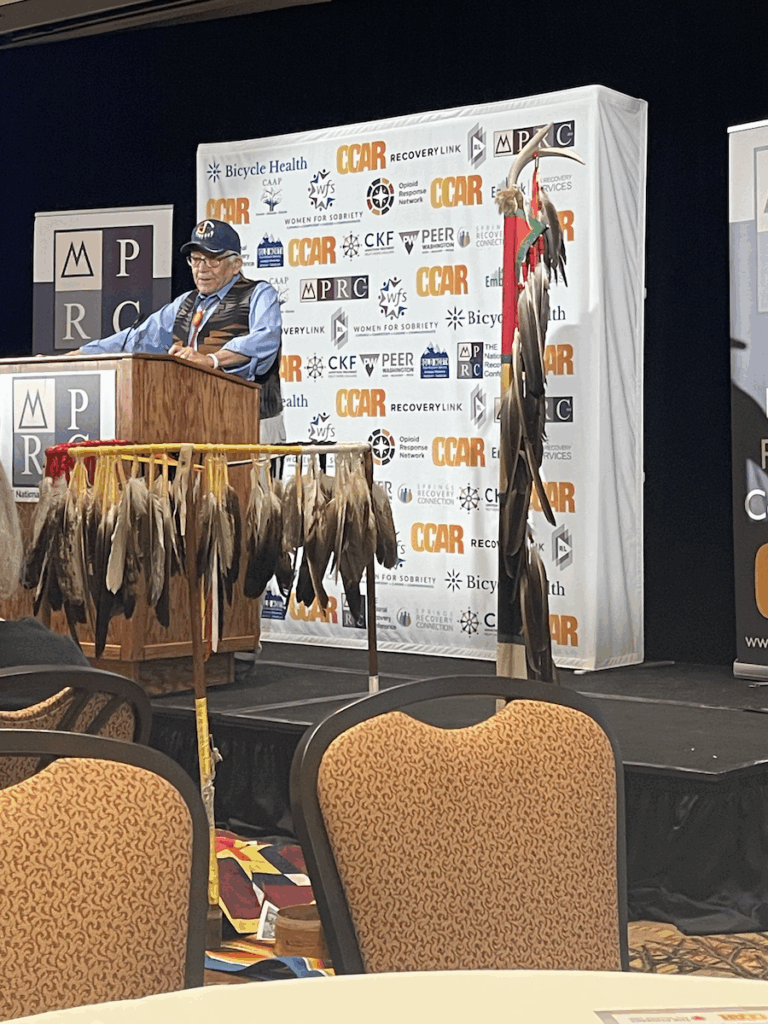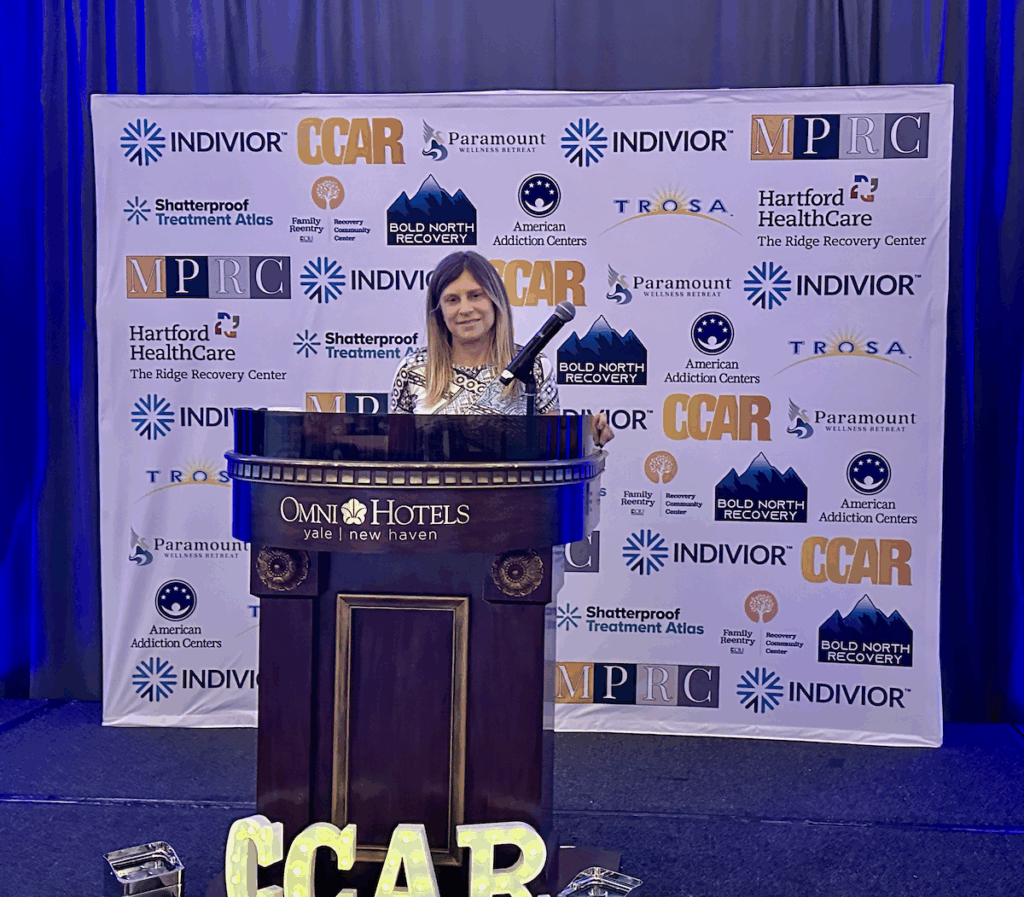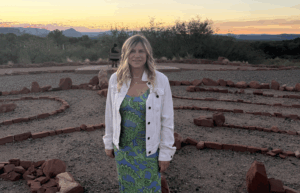Becoming a Recovery Coach has been one of the most meaningful commitments of my life, and the first of my formal trainings! I trained through CCAR (Connecticut Community for Addiction Recovery), an organization that has been a national leader in recovery advocacy, training, and peer support. Their model is rooted in one powerful belief: recovery is possible for everyone, and no one should have to walk the path alone.
What is a Recovery Coach?
A Recovery Coach is not a therapist, sponsor, or clinician. Instead, we serve as partners, guides, and allies for people who are seeking to initiate or sustain recovery from alcohol, drugs, or other addictions. The CCAR approach emphasizes:
- Meeting people where they are without judgment.
- Walking besides, not in front – supporting rather than directing.
- Empowering people to find their own recovery pathway.
- Honoring all forms of recovery – whether it’s 12-step programs, faith-based practices, medication-assisted treatment, holistic healing, or any combination.
This distinction is important: recovery coaching is about listening deeply, asking powerful questions, and holding space for someone’s unique journey.
Core Principles I Learned Through CCAR Training
During my CCAR training, I was introduced to practices that shifted the way I think about helping others:
- The Art of Active Listening – Recovery coaching begins with listening more than speaking. People in recovery need to be heard, not fixed.
- Motivational Interviewing Techniques – Instead of offering advice, we ask open-ended questions that help individuals uncover their own strengths and solutions.
- Removing Stigma – Language matters. We say, “person in recovery” instead of “addict,” and we focus on strengths rather than deficits.
- Boundaries and Self-Care – To walk beside others, we must also care for our own mental, emotional, and spiritual health.
The Power of Hope
CCAR calls coaches “hope dealers,” because sometimes the most important role we play is holding hope until someone else can carry it for themselves.
Recovery coaching is not just about supporting sobriety—it’s about helping people rebuild their lives. That may mean finding safe housing, exploring educational opportunities, reconnecting with family, or simply having someone who believes in them during dark moments.
Through this work, I’ve learned that recovery is not a destination; it’s a lifelong process of growth, resilience, and connection. Every conversation is a reminder that healing happens in community.

My Commitment Going Forward
As a CCAR-trained Recovery Coach, I am dedicated to:
- Walking with individuals in recovery, no matter where they are on their journey.
- Continuing my own growth and training to serve with integrity and compassion.
- Advocating for recovery-oriented systems of care in our communities.
- Being a voice for hope and possibility.
Recovery coaching is a calling—one that reminds me daily that people are stronger, more resilient, and more capable than they often realize. My role is simply to walk beside them, carrying hope, until they’re ready to carry it themselves.
Overview of the CCAR Recovery Coach Training Process
To qualify for the RCP designation, applicants must complete a total of 60 hours of Recovery Coach Training, including two core CCAR courses:
- CCAR Recovery Coach Academy (30 hours) – a 5-day intensive training that covers core competencies for recovery coaching: active listening, asking good questions, self-awareness (“managing your own stuff”), recovery wellness planning, boundaries & ethics, stages of change, culture & power/privilege, etc.
- CCAR Ethical Considerations for Recovery Coaches (16) hours of training that explores ethical practice, boundaries and professional integrity
After the “core” work and ethical considerations, you are required to take four of five other trainings:
- Spirituality and Recovery Coaching – Deepen your understanding of your own beliefs while learning how to support others in exploring their spiritual path in recovery.
- Recovery Coaching in the Emergency Department – Gain skills to apply recovery coaching in fast-paced hospital and emergency settings, helping individuals connect to recovery at critical intervention points.
- Recovery Coaching in Justice Settings – Learn how to support individuals involved in the criminal justice system and navigate the systemic challenges they face in accessing recovery.
- Recovery Coaching and Professionalism – Strengthen your professional presence, ethics, and boundaries to succeed in structured, clinical, or organizational environments.
- Coachervision – Designed for supervisors and program managers, this training offers tools to effectively support recovery coaches-even without lived experience.
I received my Recovery Coach Professional Designation from CCAR in July of 2021, and offer several different types of recovery coaching to my clients:
- Private Practice Recovery Coach– Offering services independently, similar to a life coach.
- Sober Companion– Providing intensive, sometimes live-in support, during early recovery.
- Integrated Wellness Coach– Combining recovery with mindfulness, yoga, sound healing, Reiki, or other wellness modalities.
- Sober Living Recovery Coach — Providing ongoing, practical, and emotional support to individuals living in sober homes or transitioning from treatment to independent living
I also offer complimentary practices in combination with recovery coaching, such as breathwork, and sound healing. These practices build stress resilience and help connect my clients with their bodies.
Multiple Pathways of Recovery Conference
As with all the modalities that I am trained in, it is important to be up to date on the latest innovations in practice. Every other year, I attend a Multiple Pathways of Recovery conference. (MPRC). The first one I attended was in Colorado Springs in 2022.

The conference aimed to bring together people across the country to learn about and celebrate multiple pathways of recovery — including different methods, practices, rituals, programs, and belief systems. The workshops and sessions touched on:
- Recovery coaching— sessions around peer support, coaching the recovery journey
- Advocacy— policies, community/legislative advocacy in recovery.
- Self-care— for people in recovery and the professionals/peers supporting the
And of course, the
- Multiple pathways of recovery— exploring different methods, programs, belief systems.
There are many different ways to conquer addiction.
Secular and Science-Based Programs
- SMART Recovery – Focuses on self-management and cognitive-behavioral tools. Uses a 4-point program: motivation, coping with urges, managing thoughts/emotions, and balanced living. Emphasizes empowerment over powerlessness.
- LifeRing Secular Recovery – Peer-support groups where people create “personal recovery plans.” Strongly secular; meetings focus on mutual support rather than spiritual elements.
- Women for Sobriety (WFS) – Designed specifically for women. Uses 13 affirmations that emphasize positivity, emotional growth, and self-worth. Offers in-person and online meetings.
- Moderation Management (MM) – For people aiming tomoderate rather than abstain from drinking. Provides structured steps and self-monitoring tools. Sometimes a stepping-stone toward full abstinence.
Faith-Based (but Non-AA) Approaches
- Celebrate Recovery – A Christian 12-step program that integrates biblical principles with recovery support. Includes all addictions and compulsions, not just alcohol.
- Refuge Recovery – A Buddhist-inspired program using mindfulness, meditation, and the Four Noble Truths. Emphasizes compassion and present-moment awareness.
Therapy & Clinical Approaches
- Cognitive Behavioral Therapy (CBT) – Delivered individually or in groups, often with licensed therapists. Targets the thoughts, triggers, and behaviors that drive addictive patterns.
- Medication-Assisted Treatment (MAT) – Includes FDA-approved medications likenaltrexone, acamprosate, or disulfiram. Works best when paired with counseling or peer support.
- Contingency Management – Provides rewards for maintaining sobriety or meeting recovery goals. Has strong research support, especially in outpatient settings.
Holistic & Wellness-Based Options
- Mindfulness-Based Relapse Prevention (MBRP) – Integrates meditation and mindfulness to reduce cravings and reactivity.
- Yoga, breathwork, and sound healing – Can be complementary practices that build stress resilience and help reconnect with the body.
- Therapeutic communities & retreats – Structured, immersive environments focusing on recovery through group living and holistic therapies
In August of 2024, I attended the MPRC in New Haven CT 2024, where I learned that recovery is my superpower. You can learn more about this by reading my blog on the topic. see blog

Summary:
As a holistic wellness practitioner, Recovery Coaching, like all of the modalities in which I am trained, is meant to meet my clients where they are at, each as a unique biodiverse person, and create an individualized program for them, which often combines a combination of modalities.



